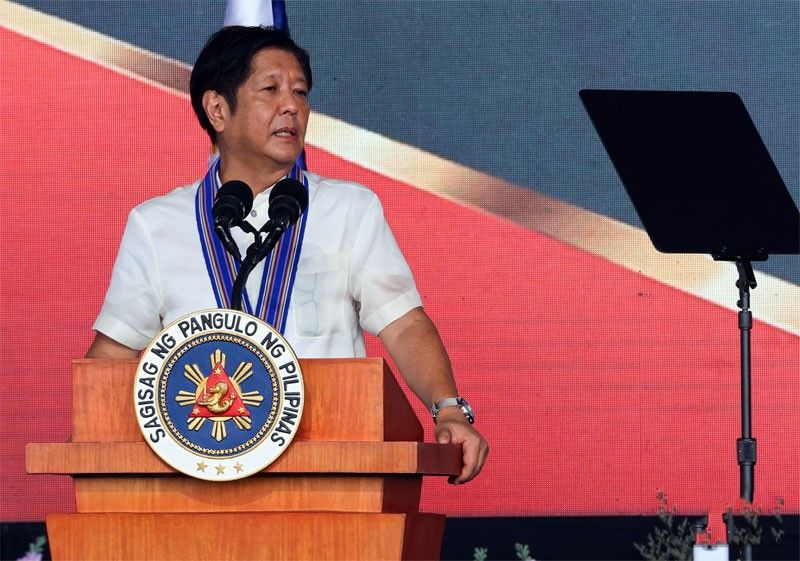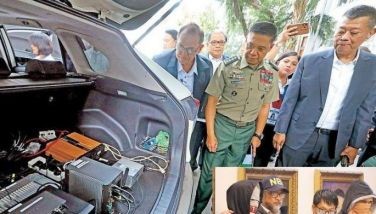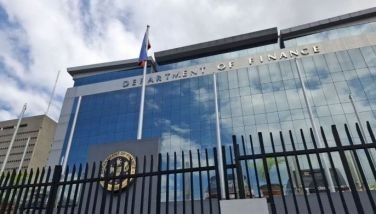Marcos to DOJ, NBI: Probe smuggling of agricultural crops

MANILA, Philippines — President Marcos has directed concerned agencies to investigate the smuggling, hoarding and price fixing of onion and other agricultural products, acts that he described as tantamount to economic sabotage.
“I have given instructions to the DOJ and the NBI to initiate an investigation into the hoarding, smuggling, price fixing of agricultural commodities,” Marcos said, referring to the Department of Justice and the National Bureau of Investigation, respectively.
Marcos, who also serves as agriculture secretary, said the order stemmed from the House hearings conducted by Marikina Rep. Stella Quimbo.
“The findings that they came up with...are sufficient for us to initiate an investigation into what amounts to economic sabotage,” he said in a video message released by Malacañang yesterday.
“And that is why we are going to be very, very strict about finding these people and making sure that they are brought to justice,” he added.
In a statement, the Presidential Communications Office (PCO) said Quimbo sent a memorandum to Marcos stating that “substantial evidence” has been uncovered pointing to the existence of an onion cartel.
Quimbo, who led the hearings of the House agriculture and food committee, tackled the causes of the surge in onion prices last year.
She said the cartel, operating primarily through the Philippine VIEVA Group of Companies Inc. (PVGCI), is engaged in various activities such as farming, importation, local trading, warehousing and logistics.
During the hearings, it was learned that while the sharp rise in onion prices that started in July last year was linked to supply shortage, data from the agriculture department showed only a modest shortage of about 7.56 percent.
This means the significant inflation rates reaching 87 percent in December cannot be justified.
Citing a report by Quimbo, the PCO said responses from cold storage facility owners during the hearings indicated a sufficient supply of onions during the time of the price hikes.
“This led to the examination of an alternative explanation: cartel activity. The cartel allegedly engaged in price-fixing through manipulation of stocks, leveraging control over cold storage facilities,” the PCO said.
Lilis “Leah” Cruz, who was referred to as the “Sibuyas (onion) Queen,” has denied that she was into onion importation.
Cruz said she was just involved in trucking and helping farmers.
“However, Quimbo said evidence presented in the hearings confirmed Cruz’s heavy involvement in the onion industry,” the PCO said.
Quimbo alleged that Cruz is the majority stockholder of PVGCI, which has been linked to cartel operations, including coordination of stock withdrawals and price-fixing.
The lawmaker presented an “onion matrix,” showing the firms that are trading and importing onions and other vegetables are allegedly acting in connivance with the owners of cold storage facilities.
Quimbo urged the NBI, the Philippine Competition Commission and the enforcement unit of the agriculture department to expose the onion cartel.
Task force
Following Marcos’ order, the DOJ announced that it would create an inter-agency task force that would investigate and prosecute agricultural smugglers tagged for the excessive prices of onions.
The DOJ said it would create the anti-agricultural smuggling task force to be composed of the Bureau of Customs, the Department of Agriculture and other concerned government agencies.
“Together with these agencies, the department will create an Anti-Agricultural Smuggling Task Force along with a special team of prosecutors who will focus on protecting the entire agricultural sector, not only the onion industry,” the DOJ said in a statement.
It said chief state prosecutor Richard Anthony Fadullon and NBI director Medardo de Lemos will head the task force, while NBI investigators will collect evidence, conduct interviews and analyze data to “uncover the intricate web of onion smuggling networks.”
“The shared objective is clear: to dismantle these smuggling networks and ensure that those responsible are brought to justice,” the DOJ said.
It said it has started building a case against some persons and organizations tagged in onion smuggling.
“Charges will be filed as soon as the cases are airtight.”
Primary targets of the task force are violators of the Anti-Agricultural Smuggling Act of 2016 and other relevant laws that prohibit illegal importation, profiteering, hoarding and smuggling, which the DOJ said the state recognizes as “acts of economic sabotage.”
“The DOJ is one with the President in his commitment to eradicate onion smuggling in the Philippines. The department is not only focused on investigation and prosecution, but also in enhancing the regulatory framework and strengthening border controls to prevent future incidents,” the agency said. — Neil Jayson Servallos
- Latest
- Trending
































